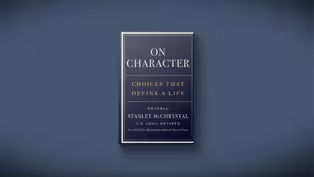
What's behind the significant drop in opioid overdose deaths
Clip: 5/15/2025 | 5m 44sVideo has Closed Captions
What's behind the significant drop in opioid overdose deaths
Drug overdose deaths in the U.S. plunged last year to their lowest level since 2019, according to the CDC. In 2024, nationwide overdose deaths fell by nearly 30,000 from the year before, a drop of about 27 percent. There were declines across all categories of drug use, including opioids, the source of most overdose deaths over the past decade. John Yang discussed more with Brian Mann of NPR.
Problems playing video? | Closed Captioning Feedback
Problems playing video? | Closed Captioning Feedback
Major corporate funding for the PBS News Hour is provided by BDO, BNSF, Consumer Cellular, American Cruise Lines, and Raymond James. Funding for the PBS NewsHour Weekend is provided by...

What's behind the significant drop in opioid overdose deaths
Clip: 5/15/2025 | 5m 44sVideo has Closed Captions
Drug overdose deaths in the U.S. plunged last year to their lowest level since 2019, according to the CDC. In 2024, nationwide overdose deaths fell by nearly 30,000 from the year before, a drop of about 27 percent. There were declines across all categories of drug use, including opioids, the source of most overdose deaths over the past decade. John Yang discussed more with Brian Mann of NPR.
Problems playing video? | Closed Captioning Feedback
How to Watch PBS News Hour
PBS News Hour is available to stream on pbs.org and the free PBS App, available on iPhone, Apple TV, Android TV, Android smartphones, Amazon Fire TV, Amazon Fire Tablet, Roku, Samsung Smart TV, and Vizio.
Providing Support for PBS.org
Learn Moreabout PBS online sponsorshipGEOFF BENNETT: Drug overdose deaths in the U.S. last year plunged to their lowest annual level since 2019, or before the pandemic.
That's according to CDC data published yesterday.
Our John Yang joins us now with more -- John.
JOHN YANG: Geoff, the numbers show that, in 2024, nationwide overdose deaths fell by nearly 30,000 from the year before.
That's a drop of about 27 percent.
There were declines across all major categories of drug use, including opioids, the source of most overdose deaths in the past decade.
Brian Mann reports on issues related to addiction for NPR.
Brian, how big a deal is this?
BRIAN MANN, National Addiction Correspondent, National Public Radio: This is the most dramatic thing we have seen really since the opioid crisis began in the 1990s.
A 27 percent drop in deaths, it's unprecedented.
The researchers I talked to say it's so vast that there's a real mystery here about why it's improving so quickly.
It's also continuing.
We have now seen about 16 months in a row where these dramatic improvements have continued.
And so, after years of a really apocalyptic situation with fentanyl and other street drugs, we finally have some truly good news here.
JOHN YANG: What are the factors that brought this about?
What do people credit for this?
BRIAN MANN: You know, again, it's -- one of the things that's fascinating as a reporter covering this is that there is uncertainty there.
There is a mystery at the heart of this.
But people point in part to the huge public health response that expanded under the Biden administration.
We really started to see the numbers coming down as early in some places as 2021.
Also, street fentanyl appears to be getting weaker in many areas, which is a phenomenon that people are trying to understand.
I want to mention one sad piece of this, that there's been so much death over the last five years.
Hundreds of thousands of people in the U.S. have already succumbed to fentanyl and other street drugs.
Many of the most vulnerable people are already gone.
JOHN YANG: The numbers came out from the CDC even as HHS Secretary Robert Kennedy Jr. was on the Hill talking about cutting federal health programs, House Republicans were working on plans to cut Medicaid.
BRIAN MANN: Yes.
JOHN YANG: Are there concerns?
The people you talk to, the experts you talk to, are they concerned that this trend may be reversed?
BRIAN MANN: I think there's real fear.
I talk to researchers, I talk to front-line physicians, people who are trying to save lives, and they point to Medicaid, the source of the largest single stream of funding for insurance for people struggling with addiction, programs that have been trying to research addiction, and what the new deadly drugs are that are appearing on the streets, right?
There are these new synthetic drugs popping up all the time.
Fentanyl is kind of almost old news now.
And if we lose the ability to track these new drugs, we could be flying blind.
There's also just kind of discussion of chaos, the same thing that we sometimes hear around tariffs.
Like, are they on, are they off?
Well, the magnitude of cuts that are being proposed here, they're really sending shockwaves.
People don't know how to start new programs, whether they should continue programs.
So, yes, at a time when there's all this good news, a lot of people are saying, if it ain't broke, why are we upending everything like this?
And I think that will be a big part of the debate we're hearing on Capitol Hill as these budgets are debated.
JOHN YANG: Is drug use declining, or is it just less lethal?
BRIAN MANN: Among young people, drug use is down dramatically.
I think it's important to say that a lot of people who are surviving are still very ill.
They're still very deeply addicted.
Survival, however -- and, again, this is important to point to the good news here.
The longer people survive in severe addiction, the better chance they have of recovering.
And even if they're still on dangerous drugs like methamphetamines or fentanyl, if we're keeping them alive, there's a shot that they're going to heal and really get better.
And, in fact -- this is important for people to know -- most people do eventually get better if we keep them alive.
JOHN YANG: And there's been a trend in caring for addict -- for addiction, treating it, managing it as a disease, rather than a failure, a moral failure.
Has that helped?
BRIAN MANN: I think there are people who are working on the front lines of this that say the public health response has been revolutionary.
It's been crucial to helping bring these numbers down.
It's probably not the whole picture, but it's a big factor.
And one thing that we really could be seeing right now with the Trump administration's policies is a shift back towards the drug war, back towards targeting the drug cartels with a really militant - - possibly even including boots on the ground in Mexico is something that's been talked about.
And so that's going to be an interesting thing over the next four years.
Do we see that public health response continue, or do we see a shift back towards policing and big drug busts?
JOHN YANG: And what are some of the other public health changes that are responsible for this, do you think?
BRIAN MANN: I think getting -- the big one is naloxone and Narcan.
There's this medication that gets into the community where people can literally reverse a fentanyl overdose or an opioid overdose.
Before that was there, people just died.
And now even many of the people in severe addiction that I talk to, they carry this and they use together -- and, again, I don't want to say this is a happy outcome.
People are still severely addicted, but they have learned how to survive to use that kind of medication.
It is also true that there are better and better medical care responses here, buprenorphine, methadone.
These are medications that really do help people recover long term.
And I think there's a big push that's happened over the past two or three years to get more people onto that kind of advanced health care.
We're going to have to see whether the funding remains going forward for more and more people to get into long-term medical recovery.
JOHN YANG: Brian Mann of NPR, thank you very much.
BRIAN MANN: Thanks for having me.
A Brief But Spectacular take on a birthright to capital
Video has Closed Captions
Clip: 5/15/2025 | 3m 45s | BRIEF BUT SPECTACULAR (3m 45s)
Chef inspires others to embrace their heritage through food
Video has Closed Captions
Clip: 5/15/2025 | 6m 39s | Lao and Proud: Chef inspires others to embrace their heritage and history through food (6m 39s)
Judge whose son was murdered urges leaders to end rhetoric
Video has Closed Captions
Clip: 5/15/2025 | 7m 16s | 'Lives are at stake': Judge whose son was murdered urges leaders to end hostile rhetoric (7m 16s)
News Wrap: Walmart says it is raising prices due to tariffs
Video has Closed Captions
Clip: 5/15/2025 | 6m 30s | News Wrap: Walmart says it is raising prices due to tariffs (6m 30s)
Retired Gen. McChrystal on current Pentagon leadership
Video has Closed Captions
Clip: 5/15/2025 | 7m 19s | Retired Gen. McChrystal on current Pentagon leadership and his new book 'On Character' (7m 19s)
Supreme Court hears Trump's birthright citizenship challenge
Video has Closed Captions
Clip: 5/15/2025 | 8m 39s | Supreme Court hears Trump’s challenge to birthright citizenship and judicial constraints (8m 39s)
Trump wraps Mideast tour with UAE pledging new investment
Video has Closed Captions
Clip: 5/15/2025 | 5m 30s | Trump wraps Mideast tour with UAE pledging new investments in U.S. (5m 30s)
Providing Support for PBS.org
Learn Moreabout PBS online sponsorship
- News and Public Affairs

FRONTLINE is investigative journalism that questions, explains and changes our world.

- News and Public Affairs

Amanpour and Company features conversations with leaders and decision makers.












Support for PBS provided by:
Major corporate funding for the PBS News Hour is provided by BDO, BNSF, Consumer Cellular, American Cruise Lines, and Raymond James. Funding for the PBS NewsHour Weekend is provided by...






